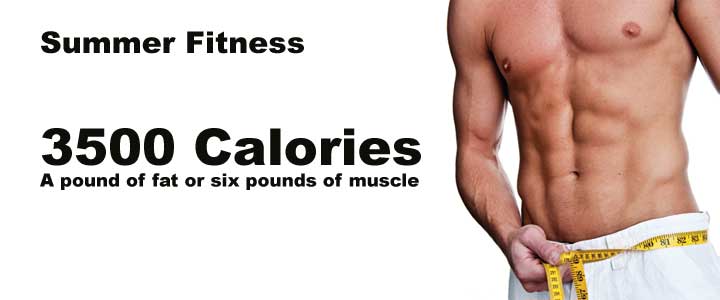 Mind, Body & Soul
Mind, Body & Soul
3500 Calories – A pound of fat or six pounds of muscle
Most fitness conscious people know that there are 3500 calories in a pound of fat, so if you create a deficit of 3500 calories in a week, you lose a pound of fat.
 Mind, Body & Soul
Mind, Body & Soul
3500 Calories – A pound of fat or six pounds of muscle
Most fitness conscious people know that there are 3500 calories in a pound of fat, so if you create a deficit of 3500 calories in a week, you lose a pound of fat.
Well…like most things in life, it isn’t quite that simple. First, this assumes that all the weight lost is adipose tissue (fat), whereas we know that inevitably when we lose weight, some of that loss is lean body mass along with the body fat.
Our bodies have mechanisms within them, known as homeostasis, which means that they are constantly striving to maintain a balance. So although the amount of body fat lost is based on initial body fat level and the size of the calorie deficit, lean people tend to lose more lean body mass and retain more fat; fat people tend to lose more body fat and retain more lean tissue. This explains why obese people can tolerate aggressive low calorie diets better than already lean people. For those of us wishing to lose a moderate amount of body fat from a body which is not excessively fat, a gentler more conservative approach to dieting can be more successful, especially if the goal is to retain or improve muscle mass.
While a pound of fat metabolizes into about 3500 calories, a pound of muscle yields only about 600 calories. So if you create a weekly calorie deficit of 3500 calories, and you manage to lose nothing but body fat, you will lose one pound in weight. But if you lost instead 100% muscle, you would lose almost six pounds in weight. And the mirror will not love you!
So if you have a high initial body fat percentage, then you are going to lose more fat and less muscle, so you may need a larger deficit to lose the same amount of weight as a lean person. In other words, you should diet fairly aggressively. A lean person wishing to retain muscle mass should adopt a gentler approach. As your body fat percentage decreases, you need to ease up on the diet, and gradually take a gentler approach, in order to arrive at the final goal of your ideal weight and a decent amount of muscle.
 Typically, weight loss slows down over time for a constant diet, as people reach a plateau. This occurs for several reasons. Dramatic results occur in the early weeks, sometimes related simply to a loss of water content. Homeostasis ensures that this stabilizes fairly soon. The change in the balance of body fat and lean tissue slows down the metabolism, and in any case after a few weeks, people typically relax the strictness of their diets, as they see improvements and feel able to continue at a gentler pace. This is in fact a good thing, as it conserves muscle.
Typically, weight loss slows down over time for a constant diet, as people reach a plateau. This occurs for several reasons. Dramatic results occur in the early weeks, sometimes related simply to a loss of water content. Homeostasis ensures that this stabilizes fairly soon. The change in the balance of body fat and lean tissue slows down the metabolism, and in any case after a few weeks, people typically relax the strictness of their diets, as they see improvements and feel able to continue at a gentler pace. This is in fact a good thing, as it conserves muscle.
Progressive resistance training and a high protein diet can modify the proportions of weight loss as between fat and muscle. This is why weight training, supported by an adequate level of protein in the diet, is essential to achieve a long term change in body composition.
For a man, a typical daily calorie requirement is 2000 calories. For each pound of muscle you add, this increases by 50 calories (the amount the body burns each day just to maintain that extra muscle. So a typical man who works out regularly and over time adds say 20 pounds of muscle to his frame, will need a daily intake of 3000 calories. Figure out what your normal intake of calories is per day to maintain your current body weight, then use the following guidelines:
15-20% below maintenance calories = a conservative diet, most likely to retain muscle
20-25% below maintenance calories= moderate deficit
25-30% below maintenance calories = aggressive deficit, for the early stages of a diet if your body fat % is high
Above 30% is very aggressive, and is likely to carry some health risks
So just reducing calories is too simple a solution to weight loss. If you are a couch potato then you can be more aggressive in your diet. If you are a bodybuilder preparing for a competition, you need to take a slow and gentle approach, starting your diet early to arrive at the optimum level of body fat by the day of competition. And regardless of where you start, include weight training in your program if you want the improvement to last.














